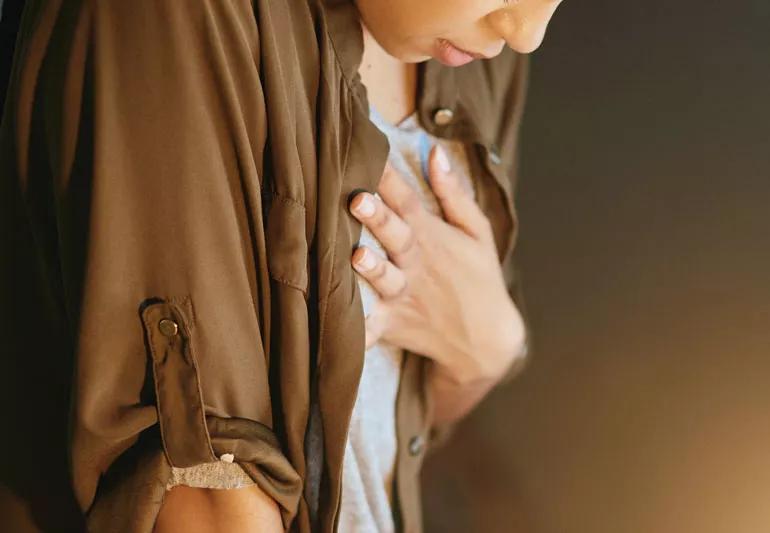Tips for reducing nocturnal heartburn

Image content: This image is available to view online.
View image online (https://assets.clevelandclinic.org/transform/290b6e18-a90d-403b-81c3-bd33f6004284/heartburnNight-904583764-770x533-1_jpg)
woman with heartburn at night
You get it after you eat spicy food. You even get it when you wear tight pants and belts. If you suffer from heartburn, you know that burning sensation in your chest is always unpleasant. But you may wonder why it often seems worse when you’re trying to get some sleep. Why is it more likely to flare up at night?
Advertisement
Cleveland Clinic is a non-profit academic medical center. Advertising on our site helps support our mission. We do not endorse non-Cleveland Clinic products or services. Policy
Blame it on the natural force of gravity. It doesn’t work in your favor when you’re lying down. When you sit or stand, gravity helps move your food through the esophagus and into the stomach where digestion occurs.
“When you’re lying down, you lose gravity’s help in allowing your esophagus to clear food, bile and acids,” says gastroenterologist Scott Gabbard, MD. “That can allow for heartburn to happen.”
While every person’s experience with heartburn is a little different, most people have heartburn symptoms during the day and at night. However, many find it tougher to control at night.
When you eat, food passes down your throat and through your esophagus to your stomach. A muscle (the lower esophageal sphincter) controls the opening between the esophagus and the stomach. It remains tightly closed except when you swallow food.
When this muscle fails to close after food passes through, the acidic contents of your stomach can travel back up into the esophagus. Doctors refer to this backward movement as reflux. When stomach acid hits the lower part of the esophagus, it can produce a burning sensation. This is what we call heartburn or, more formally, gastroesophageal reflux disease (GERD).
Advertisement
“About one in 10 adults has heartburn at least once a week, and 1 in 3 have it every month,” says Dr. Gabbard. “About 10 to 20% of adults have chronic heartburn.”
Dr. Gabbard recommends these steps you can take to reduce heartburn:
Advertisement

Sign up for our Health Essentials emails for expert guidance on nutrition, fitness, sleep, skin care and more.
Learn more about our editorial process.
Advertisement
There isn’t any scientific proof that the tangy liquid offers relief for GERD symptoms
Time can light the match on that fiery feeling in your chest, but there are ways to find relief
The caffeine and natural acids in coffee may trigger acid reflux, but there are ways to lessen the effects
Wait a few hours, then start with water or ice chips, graduating to clear liquids and then, soft, bland foods
Eating a healthy diet, reducing stress, and focusing on exercise and sleep can help keep your digestive system in top form
People with an inflamed esophagus may also have other conditions that cause a nagging, persistent cough
Frequent burping can be many things — but likely not cancer
Your body naturally produces the protein that’s essential for breaking down and digesting food
Prioritize your health by managing stress, strengthening your social connections and getting quality sleep
Bolsters, blankets, pillows and blocks can offer extra support, stability and comfort
Allergies, postnasal drip, asthma or reflux could be to blame for a cough that won’t quit